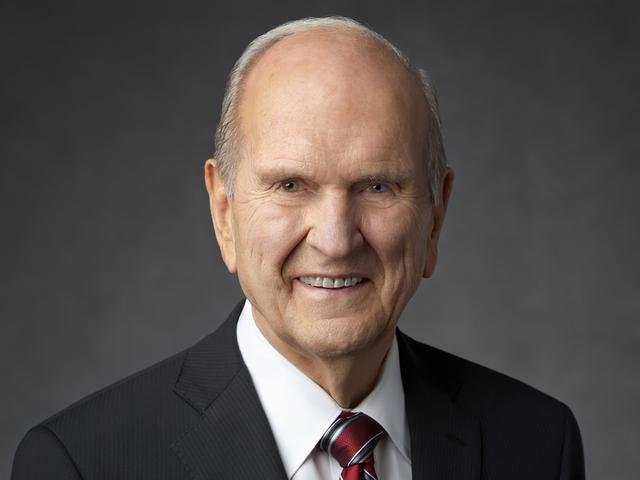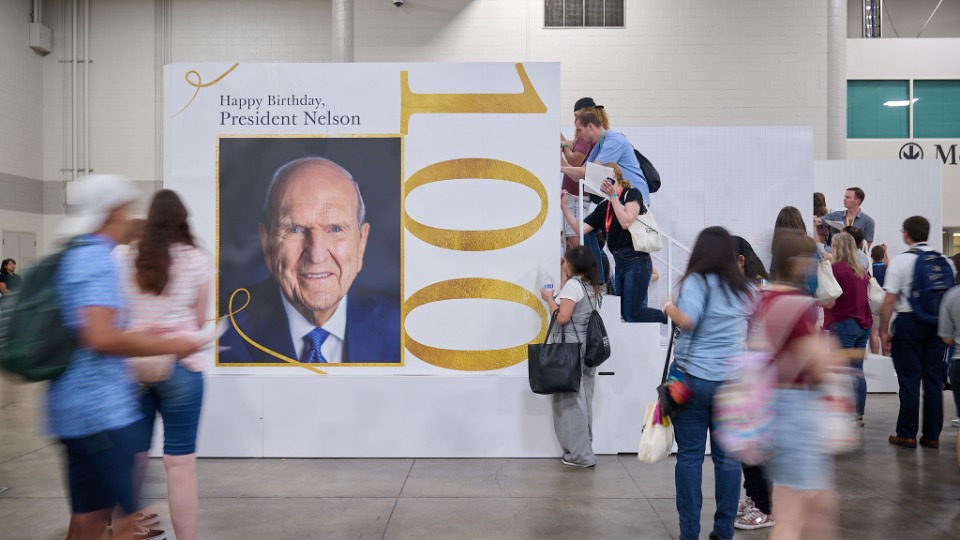
20240802_135422_CPowell_CEP9796.jpg
Young single adult Latter-day Saints sign a giant birthday card for President Russell M. Nelson’s upcoming 100th birthday during the 2024 Utah Area Young Single Adult Conference held at the Salt Palace Convention Center in Salt Lake City on Saturday, Aug. 3, 2024. 2024 by Intellectual Reserve, Inc. All rights reserved.This story appears here courtesy of TheChurchNews.com. It is not for use by other media.
By Ryan Jensen, Joel Randall, Church News
On September 9, 2024, President Russell M. Nelson, the President of The Church of Jesus Christ of Latter-day Saints, will turn 100 years old. In his six-plus-year tenure as Prophet and leader of the global faith, he has become the oldest President of The Church, reinforced the correct name of the Church, guided members through a worldwide pandemic, spearheaded a home-centered and Church-supported curriculum with the “Come, Follow Me” program, and announced 168 temples worldwide while reminding members to “keep on the covenant path.”
To help put these and other historic events of President Nelson’s life into context, Church News welcomes back historian Richard E. Turley Jr., who has worked with and observed President Nelson for decades, to talk about his decades of selfless service in the Church.
Listen to the Church News podcast on Apple Podcasts, Amazon, Spotify, YouTube or wherever you get podcasts.
Transcript
Richard E. Turley Jr.: You know, there are many teachings that we have heard from him. I think the first thing that sort of grabbed people’s attention was the idea of staying on the covenant path. That phraseology is now a part of our Latter-day Saint vocabulary, to stay on the covenant path. In his case, the idea of staying on the covenant path is a reminder to each of us that if we will simply do that, then we don’t need to worry about our eternal destiny. No matter what else happens around us, and this is another one of his teachings, we can be happy regardless of our circumstances. He’s taught us to focus on our own spiritual education. And as with all principles of the gospel, when we live them, we learn them more completely. And as I have sought to follow the counsel that he has given, the direction that he has given, I have been reinforced in my testimony of the gospel and my recognition of President Russell M. Nelson as a true Prophet of God and the Lord’s chosen President for His Church.
1:09
Jon Ryan Jensen: This is Jon Ryan Jensen, editor of the Church News. Welcome to the Church News podcast. Today, we are taking you on a journey of connection as we discuss news and events of The Church of Jesus Christ of Latter-day Saints.
In anticipation of the 100th birthday of Church President Russell M. Nelson in September 2024, the Church News is excited to welcome back a guest from previous episodes to help put in context the significance of President Nelson’s 100 years of life and his decades of selfless service in the Church.
Richard E. Turley worked and served in The Church of Jesus Christ of Latter-day Saints as both the managing director of its Public Affairs Department and managing director of the Family and Church History Department. He was the assistant Church historian and has worked on notable projects that have included everything from the launch of FamilySearch.org to the publishing of the Joseph Smith Papers. Turley earned his bachelor’s degree in English from Brigham Young University, where he was a Spencer W. Kimball Scholar, and he later graduated from the J. Reuben Clark Law School, also at Brigham Young University, where he served as executive director of the Law Review.
For the context of today’s interview, Turley has worked with and observed the service of President Russell M. Nelson for decades and accepted graciously our invitation to talk about President Nelson’s century of life.
Rick, thank you for joining us. We look forward to talking with you today.
Richard E. Turley Jr.: Thank you.
2:26
Jon Ryan Jensen: The first question I have for you is in regards to the significance of President Nelson’s birthday. How significant is it to have a Church leader reach the 100-year mark?
Richard E. Turley Jr.: It’s significant on a number of levels. First, we’ve never had one before who has reached age 100. The closest we’ve gotten is with President Gordon B. Hinckley, who was 97 when he passed away. Having Church leaders reach the age of 90-plus is something that first occurred with President Wilford Woodruff. He was a first-generation Church member, contemporary of Joseph Smith, essentially, and he reached 90.
Before that time, Joseph Smith only lived till age 38, and believe it or not, that was close to the life expectancy of people who were born about the time that he was. The life expectancy was brought down in part by infant mortality rates, and if you survived infancy, then you had a better chance of living longer. But the reality is that because of the Word of Wisdom and other good health practices of Latter-day Saints, we tend to live longer than our peers in other cohorts. And so it’s not unusual for our Church members to live a very long time.
And it just so happens that with the exception of events like the flu pandemic of the early 20th century and recent COVID, life expectancy has been creeping upwards since Joseph Smith’s day. And in the United States alone, there are over 100,000 people who are centenarians, people who have reached age 100 or more.
Jon Ryan Jensen: That is a lot of people.
Richard E. Turley Jr.: Globally, there are over 700,000, and the expectation over the next few decades is that we’ll end up in the tens of millions. So in many ways, President Nelson is setting a standard for a new age group for our leadership.
4:09
Jon Ryan Jensen: And President Nelson is no stranger to setting new standards for others to follow. But are there some specific things that he’s done that are unique to his tenure as President of the Church?
Richard E. Turley Jr.: Each President’s tenure is unique. No President has a tenure exactly like another one, but he has been distinguished by a number of the teachings that he has given to us and also by some of the things that he has done. When he first became the candidate for President of the Church, he interviewed all of the potential people who could be his counselors right there in the temple with him, which is something that was not typical, and then that just sort of laid a standard for doing things in a way that was, what he felt, was following the Spirit, guiding him in his ministry.
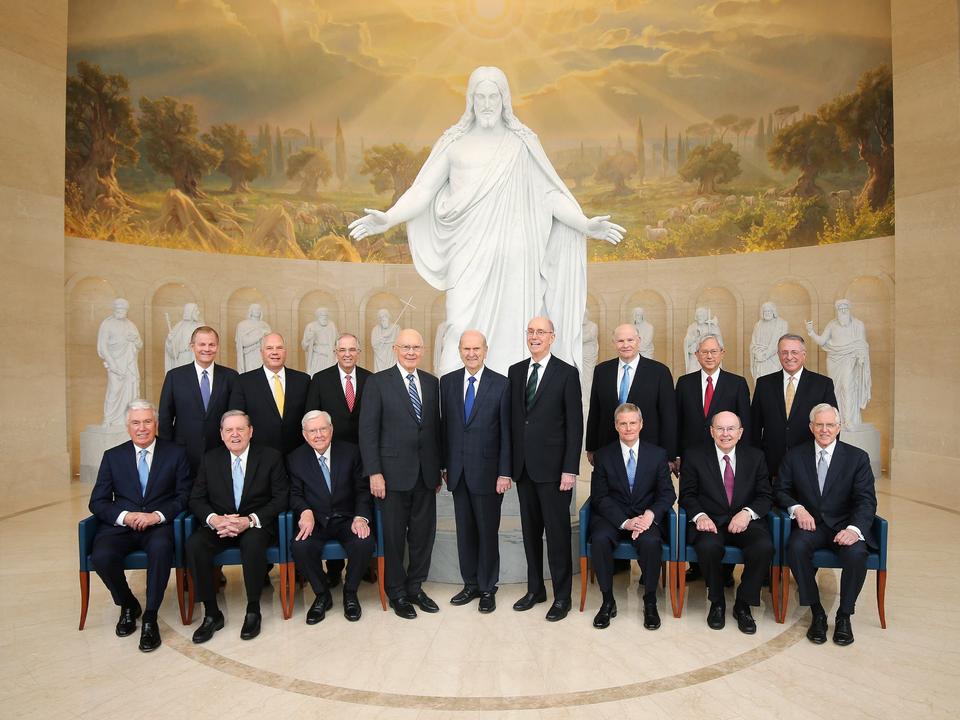
Apostles' Work Continues
Every member of the First Presidency and the Quorum of the Twelve Apostles of The Church of Jesus Christ of Latter-day Saints posed for an iconic photograph in the Rome Italy Temple visitors center in Rome, Italy on Monday, March 11, 2019. Photo by Jeffrey D. Allred, courtesy of Church News.Copyright 2020 Deseret News Publishing Company.Then of course, after that, he did a lot of things that have never been done before. He dedicated the Rome temple, and while he was there — I was in that entourage — he met with the pope, and that had never been done before by one of our Latter-day Saint Church Presidents. I can remember we were sitting in a First Presidency meeting before this trip, and he was talking about how he had invited all of the First Presidency and the Twelve to attend this temple dedication. Once again, that had never been a common thing to do, but in this case, it was truly unique in that the First Presidency and Quorum of the Twelve had never been outside of the United States together. And so I mentioned that to him, and he said, “Well, then no one better get sick,” because we wanted to take a photograph of this historic event, which we did, and that will be one of the memorable photographs documenting his ministry.
5:54
Jon Ryan Jensen: I think that’s notable, too, for members to understand that it’s not like members of the Quorum of the Twelve or First Presidency or any Church leader, Seventy, organizational presidency member, they don’t get to choose when and where they go while they’re serving. That all is handled through an assignment committee. So this really was monumental for him to make that choice.
6:13
Richard E. Turley Jr.: It was. And he has shared with other members of the Quorum of the Twelve and other general authorities and general leaders opportunities that in the past were generally performed usually by the Church President. So he has shared those opportunities in a way that hasn’t previously been done. In the distant past, temple dedications were rare, and therefore the Church President performed them. As they have become more frequent over time, we reached a point at which others began to assist with that. But no one has shared that experience, that opportunity, more than President Russell M. Nelson.
That also reflects his management style. He is one who has worked very hard to have the First Presidency and the Quorum of the Twelve work closely together. Over time, sometimes the President has worked primarily with his counselors or even alone during some periods of time because of health or other considerations. President Nelson has been very sharing in terms of providing opportunities for many people to enjoy these wonderful spiritual experiences.
7:16
Jon Ryan Jensen: Yeah, delegating when he can. There are certain things he can’t, but delegating what he can to help them build their abilities spiritually.
Richard E. Turley Jr.: Yes. And then his, you know, there are many teachings that we have heard from him. I think the first thing that sort of grabbed people’s attention was the idea of staying on the covenant path. That phraseology is now a part of our Latter-day Saint vocabulary, “to stay on the covenant path.” And it’s a very good analogy, if you will. It’s a very good way of thinking about how we live. We’ve heard about the straight and narrow path from the Book of Mormon on, and even earlier than that with the Savior’s teachings. And when I say earlier on, of course, when Nephi and Lehi had that vision, it was 600 years B.C. But what I meant is in terms of the coming forth of the scriptures.
But in his case, the idea of staying on the covenant path is a reminder to each of us that if we will simply do that, then we don’t need to worry about our eternal destiny. No matter what else happens around us, and this is another one of his teachings, we can be happy regardless of our circumstances. He’s taught us to focus on our own spiritual education. You know, as a young man growing up in a home where his parents were not active, it would have been very easy for him just to sit back and glide along with that. The Book of Mormon talks about things that act and things that are acted upon, or as we might say in more colloquial language, there are people who make things happen and people who watch things happen and people who wonder what happened. He’s definitely one of those who makes things happen.
Even as a child, he got to church, he studied the gospel, and I think it’s not coincidence that as a person who attended Sunday School as a young man, that he later became the general superintendent of the Sunday School organization, which was a lot more prominent in his day when he was doing that than it is today. We’ve consolidated meetings, and Sunday School is a lot less prominent than it used to be. But in the early 20th century, the president of the Sunday School was Joseph F. Smith, the President of the Church, and then he was followed by David O. McKay.
So that role that President Nelson had of being the general superintendent of the Sunday School was a very remarkable position to hold, and to have that be held by a young man who got himself to Sunday School when he was a child just shows how much he takes into consideration self-learning. And of course, during the time that he’s been President of the Church, he has encouraged the idea of a home-centered, Church-supported gospel, and the idea of learning as a family, where we can. And that, I think, is also significant, given his background.
9:55
Jon Ryan Jensen: Yeah. Do you feel that those decisions were made then, in part, because of the circumstance that he had of his parents?
Richard E. Turley Jr.: Well, certainly that was part of his background. But I also think it’s no coincidence that a renowned medical doctor is the President of the Church during the worst pandemic of our lifetimes, for most people. And I think there’s a prophetic vision behind having people study the gospel at home when you’re restricted from going to church at times.
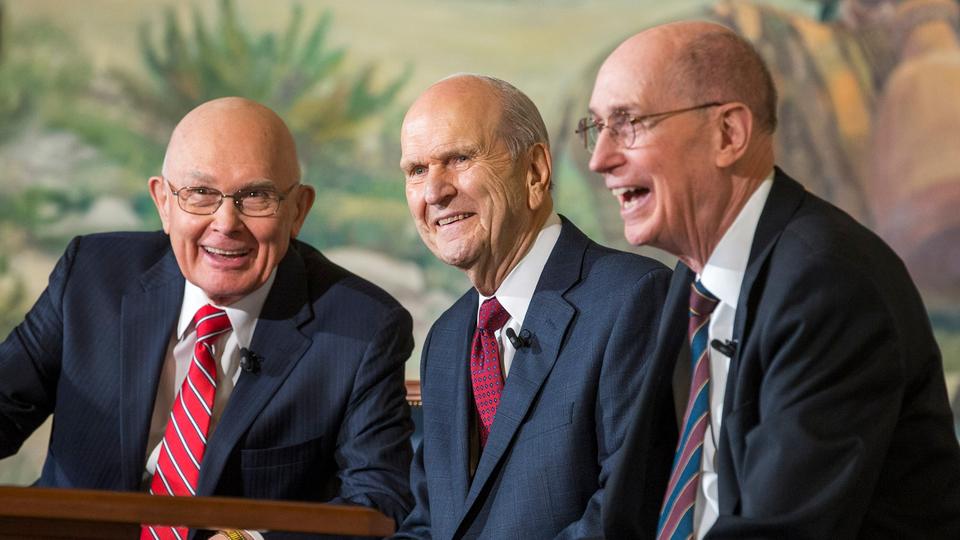
COVID-19 First Presidency
President Russell M. Nelson sits with his counselors in the First Presidency, President Dallin H. Oaks, first counselor, left, and President Henry B. Eyring, second counselor, right, at a press conference in Salt Lake City Utah on Tuesday, January 16, 2018. Photo by Scott G Winterton, courtesy of Church News.Copyright 2020 Deseret News Publishing Company.10:23
Jon Ryan Jensen: We were recently at BYU Education Week, and Deseret News editor and former Church News editor Sarah Jane Weaver was talking about the makeup of the First Presidency. Could he have known that a pandemic was coming and have chosen himself as a doctor and a lawyer and an educator to be members of the First Presidency at such a pivotal time? But I’m sure there was inspiration behind those choices.
Richard E. Turley Jr.: Absolutely. And certainly the Lord is in charge. And during our recent past, the last few decades, we’ve had great need for leadership when it comes to medical matters, because of the pandemic and other health concerns. We’ve had a need for legal advice, and of course we have a member of the First Presidency who’s a renowned lawyer. And then, of course, we’ve had a need to understand business concerns as well, and we have another counselor who does that. So I don’t think it’s a coincidence that we have the current First Presidency.
11:13
Jon Ryan Jensen: Looking back before he was President of the Church, have there been other notable times when we had doctors as leaders of the Church or other careers that were notable?
Richard E. Turley Jr.: The first medical doctor who comes to mind was a member of the First Presidency during the Brigham Young administration, Elder Willard Richards, who was also President Joseph Smith’s right-hand man, Church historian and recorder. Of course, medicine was in its infancy at that time. He was a Thomsonian doctor; we might call him an herbal or botanical healer today.
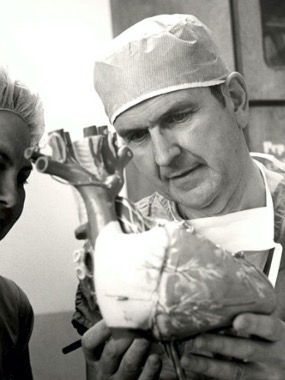
dr-nelson-heart-surgeon.jpg
Dr. Russell M. Nelson explains a surgical procedure to a nurse.But over the course of the Church’s 20th- and 21st-century existence, we’ve had a number of people who have been in health care-related professions before their calls as general authorities. I’m talking about medicine and dentistry and other related types of concerns, hospital administration. You know, currently we have, of course, Elder Dale G. Renlund, who is also a renowned heart doctor, and we’ve had many others. If you think back in the past, probably the one people know best, besides the ones I’ve already mentioned, is Elder Cecil O. Samuelson, who was also president of BYU.
12:19
Jon Ryan Jensen: And those career opportunities, in a way, do have an influence on some of those leadership styles and what they bring into their roles when they’re called to serve.
But one of the other unique parts about President Nelson is that he and President Oaks, they were called simultaneously and called directly to the Quorum of the Twelve Apostles. How does that make their Church service unique or different from some of the other leaders who’ve served in these roles?
Richard E. Turley Jr.: They had a longer professional career than some have had, and as I mentioned earlier, that professional career had a big impact on leadership in the Church. So I don’t think it was a coincidence. Again, I think the Lord controls the timing of callings, and I think He called them deliberately because He knew that there would be a time in the future where their specific skills would be needed.
13:06
Jon Ryan Jensen: Rick, we talk about, as well, the remarkable growth that the Church has experienced from its beginnings. But President Nelson has been around for more than half of that, coming up on 100 years. Can you talk about the growth that the Church has seen in that time?
Richard E. Turley Jr.: Certainly. When he was born in 1924, the Church was relatively small compared to today. We did not reach our first million in terms of the Church population until he was a young man around his 23rd year. So he has seen the Church grow from a fairly intimate, largely Utah- or Intermountain-based organization to a global one, and he has been a great contributor in that. As I’ve traveled around the world in my various Church responsibilities, I have often heard his name evoked by the people where I travel, and I have noted the tremendous contributions he’s made in opening up countries of the world to the preaching of the gospel, establishing the Church more firmly in those areas, building relationships and serving others.
14:07
Jon Ryan Jensen: Since you mentioned that people call him by name, they remember him and can think of his teachings easily at this point, I remember my parents, when I was growing up, referring to previous Prophets as, “He was my President of the Church,” and they would tell me, “President Hinckley is going to be your President of the Church,” because he was President when I was a teenager.
Are there maybe pros and cons of individuals thinking that way? Is that an OK thing for us to do, or is there some caution that we need to take there?
Richard E. Turley Jr.: It’s human nature for people to do that. But one thing I’ve noted about President Nelson is he is utterly unselfish, and he wants people to be focused on the Savior, Jesus Christ, not on him.
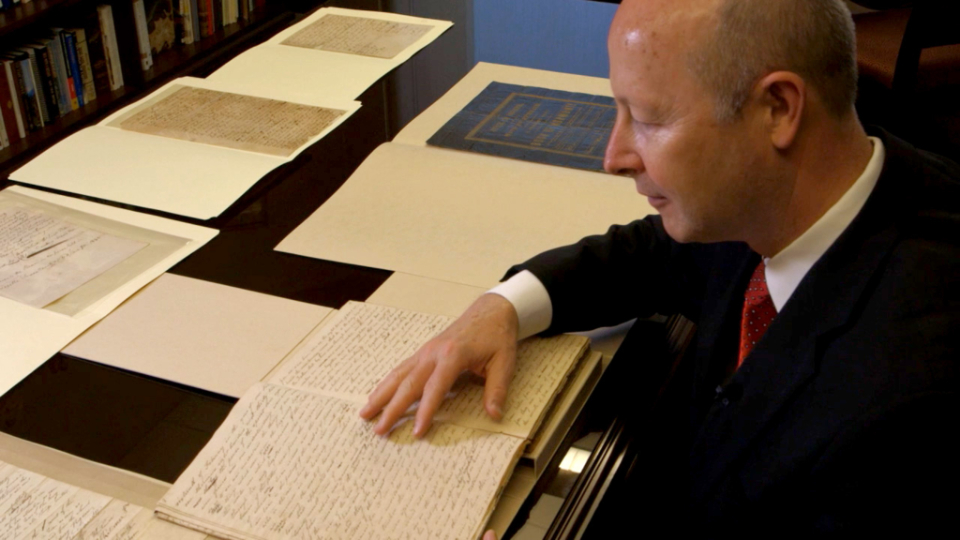
Joseph-Smith-Papers-Conference-2023
Former Assistant Church Historian Richard E. Turley Jr. reviews material included in the volumes of the newly completed Joseph Smith Papers project. President Dallin H. Oaks of the First Presidency announced that Richard would author a new biography on Joseph Smith utilizing the newly completed project.2023 by Intellectual Reserve, Inc. All rights reserved.14:47
Jon Ryan Jensen: For those who don’t know all of your background, you were assistant Church historian, and so you’ve had an opportunity — this isn’t just Sunday School learning. This is something that you have been neck deep in for a number of years.
Can you maybe share a little bit of how you have learned, and for those who say, “I wish I understood some of what these Prophets have done better,” where might you suggest they go to learn this kind of information?
15:16
Richard E. Turley Jr.: In terms of my own personal experience, I began as the managing director of the Church History Department. And over time, President Nelson, then Elder Nelson, was one of our advisers to what’s now the Church History Department, and I can remember working closely with him on a number of matters. When we were working on the Joseph Smith Papers, we had an outside advisory council, and we had an internal one, and then we would also provide it to our advisers and go up line with the text.
Some of the people we would give these thick Joseph Smith Papers volume manuscripts to us would take the full three months allotted, and even at that would give us back only a small contribution that they made after reading it. President Nelson was remarkable in that we would give him this thick volume — and of course, based on his years of experience in the medical profession and in the academy — he took that thick volume and would hand it back to us within just a few days, copiously marked up with notes, and attached to that pile of papers a single-spaced, multipage memo making suggestions. It was truly remarkable his capacity to digest things of that nature, comprehend them, and then make suggestions.
I remember also that his contributions were not just in that realm, not just an intellectual realm, but also I remember sitting in a meeting with him on a Tuesday before Thanksgiving, and as we ended the meeting, he looked around at us, and he said, “I don’t know about the rest of you, but we teach the importance of family, and I am going to take tomorrow, Wednesday, off so that I can work with my wife, Dantzel, to prepare for our family’s arrival on Thanksgiving.” You know, he lives what he preaches.
Another occasion, I was the managing director of the Family History Department in 1999 when we launched FamilySearch. President Hinckley and Elder Christofferson launched it from the Family History Library here in Salt Lake. And then Elder Nelson and I simultaneously launched it at the Press Club in Washington, D.C. And I can remember doing that together and how the next day, we had somewhere in the neighborhood of 100 million hits. And while that might just seem like an isolated event, the reality is that President Nelson has contributed a great deal to the construction and dedication of temples, and we could not have all the temples we have today were it not for FamilySearch. So the role that he had in supervising family history work at a time that was very critical in developing new tools for family history work, he was laying the foundation for later building all of these temples.
17:52
Jon Ryan Jensen: Yeah, it’s not just a matter of choosing cities at random on a map. There’s a lot that goes into that.
Richard E. Turley Jr.: FamilySearch makes it possible for individual Church members to find their ancestors and do the temple work for them. Before FamilySearch, that was far more difficult, and therefore it was difficult for people to get names for temple work. If we didn’t have FamilySearch to provide the names, we wouldn’t be able to operate the temples that have been announced.
18:15
Jon Ryan Jensen: And from the beginning of his tenure, from when he was very first sustained as Prophet and President of the Church, he immediately took that role and went straight to the youth. His first big public appearance was with youth in the Conference Center in downtown Salt Lake, and that was where he talked first about gathering on both sides of the veil.
18:35
Richard E. Turley Jr.: And that’s another phrase that has entered our Latter-day Saint vocabulary, the idea of gathering on both sides of the veil, and that it is the same work. In the past, people became a little bit compartmentalized in how they looked at the work of the Church. Some would say missionary work is the most important element. Some would say family history work is. Others would say, “No, it’s working with the living and helping to perfect them.” Some would say, “No, it’s working to help the poor and needy.” He showed us that that was all the same work, just different aspects of it. And so that phrase has become an important part of our vocabulary, and an important way for us to focus on the Lord’s work and glory, which is to bring to pass the immortality and eternal life of His children.
19:14
Jon Ryan Jensen: In a way, I look at that, and I think back prior to that merging mentality that it’s all one work. It wasn’t just that those existed in their own silos, but it was also that we kind of put it to certain age groups. The missionary work was done by the young, the 19-year-olds, the early-20-year-olds, and the family history work was done by those who had nothing better to do with their time and were, you know, past their retirement ages. And this merging kind of merges all of the age groups together too, doesn’t it?
Richard E. Turley Jr.: It does. And it makes it possible for all of us, regardless of our age, to contribute to all of those works according to however we’re inspired or called.
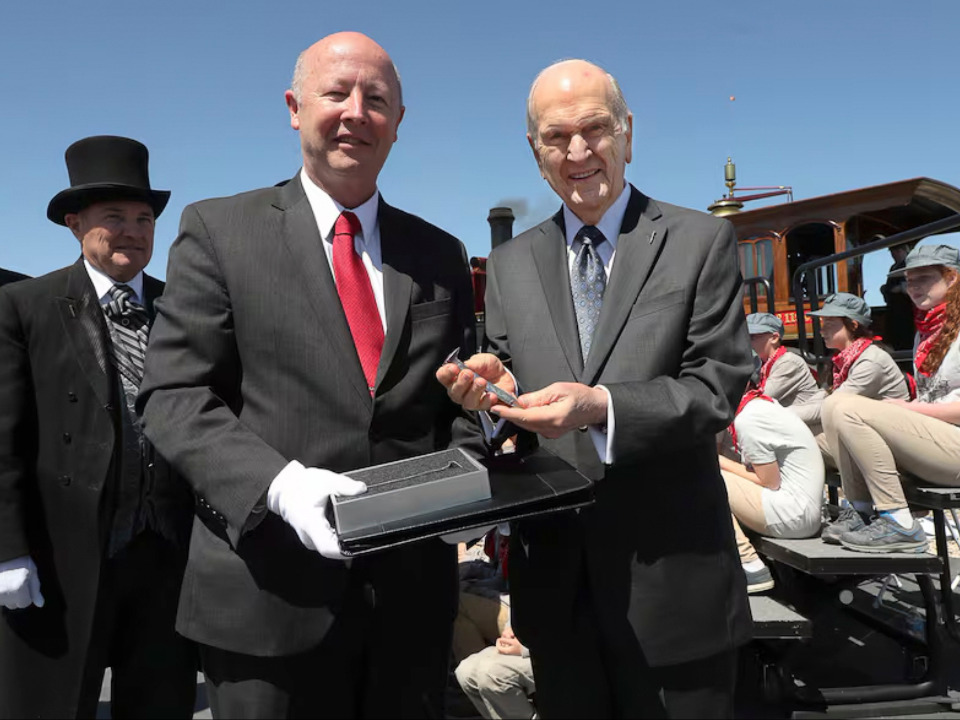
golden spike railroad 150th
President Russell M. Nelson of The Church of Jesus Christ of Latter-day Saints and Richard Turley Jr. hold the historic Utah spike during the 150th anniversary celebration at the Golden Spike National Historical Park in Promontory Summit on Friday, May 10, 2019. Photo by Jeffrey D. Allred, courtesy of Church News. Copyright 2023 Deseret News Publishing Company.19:56
Jon Ryan Jensen: As you have watched him throughout his ministry, how do you feel that your life has been blessed personally?
Richard E. Turley Jr.: Well, he’s blessed my life greatly. I first remember hearing about him in 1971 when he was called to his role in the Sunday School. I was 15 years old at the time. When I became the managing director of the Church Historical Department in January of 1986, he was a new Apostle. I came to know him personally. Besides working with him in various roles, I was blessed by him because of his ministering. Not only does he teach the gospel, but he lives it. He has spoken at the funerals of my family members. He has given me personal counsel. He has guided me in many things that I’ve done. And most recently, he, on behalf of the First Presidency, commissioned me to write a biography of the Prophet Joseph Smith, which is occupying my foreseeable future. So he’s had a great impact on my life.
Jon Ryan Jensen: And if he made it to 100, he’s going to expect you to make it to 100 and fulfill that.
Richard E. Turley Jr.: I would love to do that.
20:59
Jon Ryan Jensen: I want to go backwards for just one second. You mentioned the Joseph Smith Papers project, and now we’re also seeing the “Saints” project coming up on the release of its fourth book. And I know that, you know, as you mentioned, President Nelson has been in the details on that.
So, we’ve talked about temple work for those who have passed on. We’ve talked about missionary work for those who are alive. But for those who are currently Latter-day Saints, why do you feel that that’s been important to him, that we understand the details and have those details accessible to us about the Church’s history from beginning to now?
21:34
Richard E. Turley Jr.: When he was a child, he took the initiative to learn about the Church himself. We live in an era of screens in which people tend to be much more passive. They’re waiting for their machines to give them information. To go back to the statement about making things happen, watching things happen or wondering what happened, we have far too many people who are watching things happen or wondering what happened. And creating materials such as the four volumes of “Saints” and the “Come, Follow Me” curriculum that allows us to work at our own pace and learn as much as we want to learn, and grow and advance as much as we want to grow and advance, just fits the pattern he’s established throughout his life.
22:12
Jon Ryan Jensen: That feels a lot to me like what he exhibited when he was studying to become a doctor, when he was told you can’t touch the heart because the heart would stop working, and he had to put that to the test, and him putting it to the test resulted in advancements.
Do you see a relationship there for those who need to put to the test some of the trials of faith that maybe people have gone through before them, or that they’re facing right now?
22:42
Richard E. Turley Jr.: Yes. He’s taught us that it is not wrong to ask questions; in fact, that questions can lead to revelation and to our growth and development. And he’s not only taught that, but he’s lived that same principle. He has been one who, in his personal life, for his profession, has delved very deeply into professional literature, professional research. It’s not typical for a medical doctor to have an M.D. and a Ph.D. You know, that Ph.D. showed the research side of himself, so he was a wonderful practitioner and also a wonderful researcher, and he’s encouraged each of us, as we walk the covenant path, to progress and grow spiritually as fast as we can and to recognize that no matter what we pass through in life, in terms of trials, we can continue to stay on that covenant path and be happy at the same time.
23:32
Jon Ryan Jensen: I also want to go back one more time to his family, because his unique family situation being the only active member of the Church when he was younger, as you just mentioned, he sought that information out, put him in a unique position to learn the gospel and to be an example to people around him. And you also mentioned his first wife, Dantzel, and she passes away, and he chooses to get married a second time. And now he’s married to Sister Wendy Nelson, and they have a beautiful love for each other, but it’s also an opportunity for others to see him continuing to try to live his best life and make the best decisions for him.
Well, they’re also struggling with those kinds of decisions as well: “What do I do after a spouse has passed away, or other situation has come about?” Do you think that there’s something there that members can take away from his example?
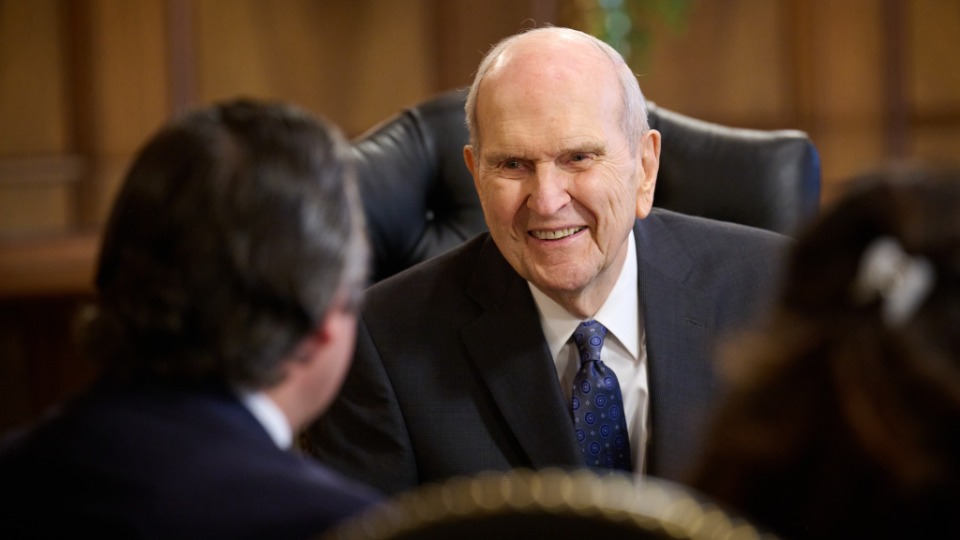
president-nelson-2024.jpg
President Russell M. Nelson 2024 by Intellectual Reserve, Inc. All rights reserved.24:20
Richard E. Turley Jr.: I do. If you study his ministry, what you see is he has reached out to people around the world in diverse settings, from diverse backgrounds, from various religious and ethnic backgrounds and from various political backgrounds, and preached unity and tried to bring people together with the recognition that it’s possible for people to disagree and yet be agreeable. He is the most agreeable of people that I know. He’s remarkable in that way. And he’s had a particular sensitivity for those who have experienced loss.
We know of him as a heart surgeon. He had some experiences as a heart surgeon that were heart-wrenching for him. He performed heart surgery on my father-in-law, so I know him as a medical doctor as well as a Church leader, and I will tell you that he is very empathetic. He’s very concerned about others and their circumstances. So yes, he’s very Christlike in the way he treats others.
25:22
Jon Ryan Jensen: Rick, thank you for spending some time with us today on the Church News podcast. As is typical for us, we love to give our guests the final word. And so my final question for you today is: What do you know now, after having accepted and followed the invitations of President Russell M. Nelson?
25:39
Richard E. Turley Jr.: Much of what he said is not new to me, given my background, but as with all principles of the gospel, when we live them, we learn them more completely. And as I have sought to follow the counsel that he has given, the direction that he has given, I have been reinforced in my testimony of the gospel and my recognition of President Russell M. Nelson as a true Prophet of God and the Lord’s chosen President for His Church.
26:16
Jon Ryan Jensen: Thank you for listening to the Church News podcast. I’m your host, Church News editor Jon Ryan Jensen. I hope you learned something today about The Church of Jesus Christ of Latter-day Saints and had your faith in the Savior increase by looking through the Church News window as a living record of the Restoration. Please subscribe, rate and review this podcast so it can be accessible to more people. And if you enjoyed the messages we shared today, please share the podcast with others. Thanks to our guests; to my producer, KellieAnn Halvorsen; and to others who make this podcast possible. Join us every week for a new episode. Find us on your favorite podcasting channels or with other news and updates about the Church on TheChurchNews.com or on the Church News app.
